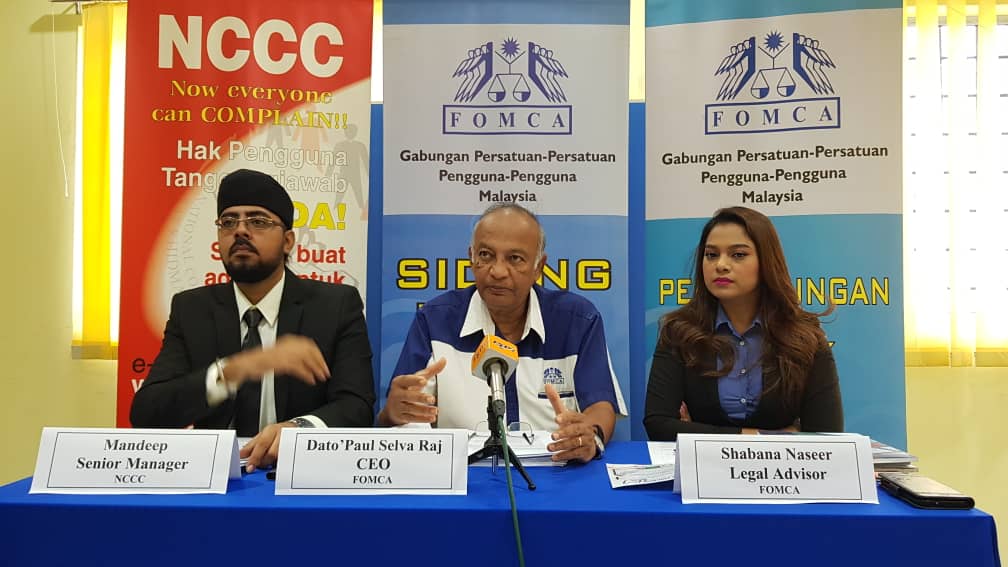(Left:Mr Mandeep Singh, Legal Advisor NCCC, Middle: Dato Paul Selvaraj, CEO FOMCA, Right: Ms Shabana Naseer Ahmad, Senior Legal Advisor NCCC)
Towards Mandatory Product Disclosure Statement for Insurance
Insurance is a critical component in financial planning and management. For an example health insurance protects consumers against costly medical bills. Life insurance protects the family against the death of a key bread winner.Without life insurance, a family can be devastated in the case of the loss of life of a family member.
Unfortunately, many Malaysians are not insured or underinsured. Thirty years ago, one in 10 Malaysians had a life insurance policy; in 2018 the number had increased to only 3.5 for 10 Malaysians. Thus penetration is still very low. Further Life Insurance Association of Malaysia (LIAM) has reported that many of those insured are under-insured. Additionally, medical costs are extremely high. Up to 40% of consumer pay their medical bills from their pocket (OOP). This is a very inefficient way of paying medical bills. Financial Literacy is essential to empower consumers to manage their finances, ensure having sufficient savings and managing their debts; further financial literacy is crucial to ensure consumers protect their families and their assets through insurance.
Yet, often, insurance policies are long, complicated and difficult to understand. Often the consumer is ignorant of what he has actually signed up for, especially the limitations of his/her policy. It is only when he makes a claim that he realises that his policy imposes certain restrictions on his claims. By then it may be too late. To ascertain, how well consumers understood their insurance policy, FOMCA undertook an online survey to assess the understanding of consumers on their insurance policies. 2,300 consumers participated in the Survey. Based on the Survey:
- 64% did not fully read their policy;
- 63% did not understand their policy; and,
- 61% did not fully understand the benefits ad limitations of the policy.
72.86% supported the need for a simple disclosure sheet for their insurance policy so that they would better understand the terms and conditions of their policies, especially the benefits and limitation, of their insurance policies.
Clearly, the survey indicates that most consumers do not full read, or fully understand the terms and conditions as well as the benefits and limitations of their insurance policy. Most consumers have requested that a simple disclosure statement should be included with the full policy in a form that is easily understood by the consumer.
FOMCA urges the government to make it mandatory for all insurers to include all the terms and conditions of the insurance product in a document to be known as the Product Disclosure Statement. The PDS is an important legal document and should be part of the insurance contract. It should be written in plain English/language and give full description of all the terms and restrictions of the insurance policy. It should include description of the features, benefits, cost and risks associated with the policy. It should also include the consequences of not paying the premiums in time. Importantly, it should state clearly how much the insurer would get when the policy matures.
The PDS would help consumers to understand their insurance policy and provide them with sufficient information about the terms and conditions, policy benefits and exclusions that would allow consumers to compare different insurance policies and make an informed decisions about what policy meets their needs. Consumers should fully understand their PDS. Should they have any enquiries or doubts, they should phone the insurance company and as for more information. Consumers should be satisfied the policy is what they need before they purchased it.
The National Consumer Complaints Centre (NCCC) continues to receive complaints on insurance companies. In 2018, NCCC received 1,089 complaints relating to insurance. In 2018, the highest number of complaints recorded by the NCCC in regards with the Insurance industry was with the claims process (31.31%) which also relates to the terms and condition of claims (10.01%). Together, both complaints combined to 41.32% of complaints on insurance related matter. The type of claims dispute that the NCCC receives indicates that insurance companies tend not to pay out as per claimed in the contract or at least what was expected by the complainant.
